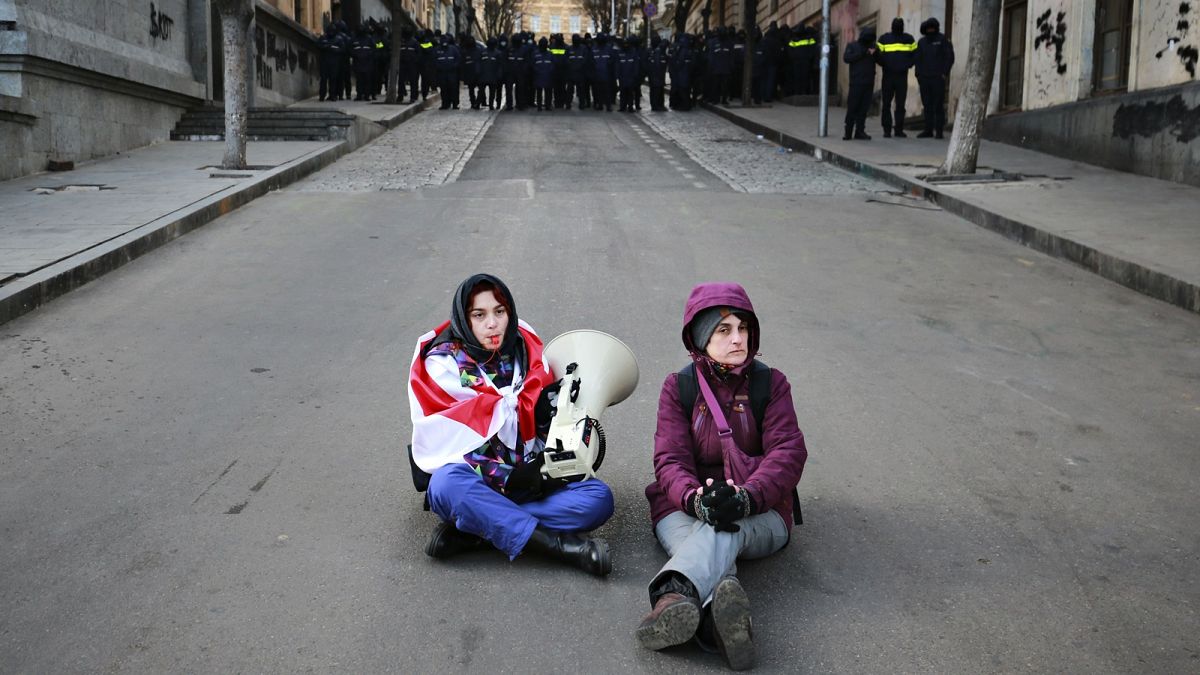The sanctions proposed by Kaja Kallas targeted state officials of Georgia involved in the repression of pro-European demonstrations.
Hungary and Slovakia have vetoed a proposal to impose EU sanctions on Georgian officials in response to the continued crackdown on protesters, several diplomats and officials told Euronews.
A separate plan to suspend visa liberalisation for Georgian holders of diplomatic passports can still move forward as it only requires a qualified majority, the same sources said. The plan needs to be developed by the European Commission.
The sanctions were put forward by High Representative Kaja Kallas during a meeting of foreign affairs ministers in Brussels.
It marked Kallas’s first proposal since taking office on 1 December.
“The developments that we are seeing right now in Georgia (are) not going in the right direction where the candidate countries should be,” she told reporters on Monday.
Ahead of the gathering, Hungary, a close ally to the ruling party, Georgian Dream, had telegraphed its intention to block any restrictive measure.
“It is nonsense, it is outrageous, there is nothing to justify it,” Péter Szijjártó, Hungary’s foreign affairs minister, said last week. “If such a proposal is officially made, we will of course veto it. Everyone can be assured of that.”
Slovakia, whose prime minister, Robert Fico, often aligns with Viktor Orbán on foreign policy, had been more discreet about its position but was too expected to say no.
It was not immediately clear if other member states had joined the Hungarian-Slovak opposition, but five diplomats consulted by Euronews said it had been only the two of them.
Under EU rules, all sanctions require unanimous approval.
Kallas’s proposal, which was not made public, targeted state officials involved in the repression of demonstrations, which began in late November after Prime Minister Irakli Kobakhidze unilaterally announced the suspension of membership talks until 2028. (The accession process was de facto frozen by Brussels over two highly controversial laws deemed incompatible with the bloc’s fundamental values.)
The violent suppression of pro-EU protests has led to chaotic clashes on the streets, arrests of opposition figures, multiple reports of injured people and hundreds of arrests, prompting statements of strong condemnation and fresh calls for sanctions.
Earlier this month, the three Baltic countries broke ranks with the EU and introduced their own set of sanctions against 11 Georgian figures, including the minister for internal affairs and several of his deputies. Bidzina Ivanishvili, the secretive oligarch who tightly controls the ruling party and supports closer ties with Russia, was also blacklisted.
Over the weekend, Latvia, Lithuania and Estonia ramped up the pressure with additional restrictions – this time targeting the prime minister himself, among others.
“This violence is against human rights, it’s criminal actually,” Margus Tsahkna, Estonia’s foreign affairs minister, said on Monday morning.
“The Georgian authorities, the Georgian Dream leaders, they have lied, they have lied to the Georgian people and to us. So there are consequences.”
The situation in Georgia has deteriorated sharply since the parliamentary elections of October, which saw the Georgian Dream obtain a majority of votes amid widespread reports of irregularities. An observation mission led by the Organization for Security and Co-operation in Europe (OSCE) noted cases of intimidation, coercion and vote-buying that “compromised” the secrecy of the vote.
As a result, opposition parties have refused to recognise the legitimacy of the new parliament and continue to demand a re-run of the elections.
On Saturday, Georgian Dream lawmakers elected Mikheil Kavelashvili, a former football player who co-authored the highly controversial “foreign agent” law, as the country’s new president. The outgoing president, Salome Zourabichvili, a staunch advocate of European integration, slammed the decision of her successor as a “parody.”
Read the full article here


